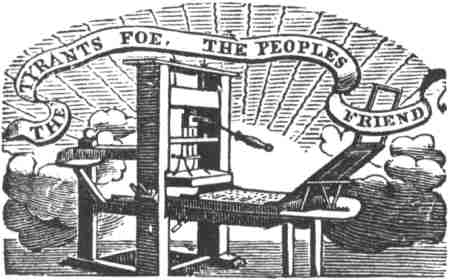In class, we like to talk about how we’ve come full-circle in many aspects of news coverage.
Using the Internet, we have expanded our “Edge,” much like people did hundreds of years ago with the invention of written news. Our wire services are influenced by a collaboration between New York newspapers, who sent reporters on boats to get news from U.S. ships. Today’s issues of press freedom are nothing compared to the Church-controlled printing system during the time of Martin Luther. You think today’s press is nasty? Take a look at the Philadelphia Aurora.
“That’s vitreol,” Professor Klein would say.
Picture taken from Ron Coleman’s blog
Strangely enough, the days of the owners of the press being the ultimate decision-makers regarding news coverage is not over. Benjamin Franklin has now been replaced with editors of foreign news operations with correspondents in the U.S.
In “Through Their Eyes: Foreign Correspondents in the United States,” author Stephen Hess talked to a number of foreign correspondents based in the U.S., many of whom complained about the influence their editors have on their writing and story coverage. Even today, a lot of coverage is based on a whim.
Takeshi Yamashita of NHK-TV in Japan describes something Hess calls a “CNN Effect”:
“Always they are watching, and they get [ideas] from CNN and they call us. This is kind of embarrassing.”
Chang Choi, a Korean television correspondent, echoed these sentiments:
“Now with the Internet and CNN and all the information fed directly to our headquarters, with our foreign news department watching the video clips or all the information on the Internet… or they type in the keyword “Korea” on New York Times and all these stories come up on the screen. We correspondents are very concerned about that situation.”
While the D.C.-based correspondents are undeniably more familiar with American news audiences and culture, the ultimate story choice decisions may come from higher up – across the pond. Judging by Yamashita and Choi’s remarks, and others who Hess surveyed, these decisions sometimes come laced with stereotypes and ignorance.
One reporter said the home office always wants stories “more stereotypical” than others. Another correspondent says her editors like to showcase stories that symbolize the negatives of American society, such as violence.
With this iron grip on the press, is the current foreign news outlet situation that much different than when owners of the press dictated circulated material?
After Johannes Gutenberg invented the printing press in 1450 (though I’ve seen way too many 1439s to think this is a mere error), only those with wealth and status were able to secure ownership of these new tools. Beginning to print newspapers, these early publishers – devoid of reporters – began to print news in the only way they could to sell a paper. They began copying other publications, writing of the hearsay they picked up in conversations, and finally, to fill space, they wrote opinionated columns, showcasing their views.
When you think about it, does this degree of control mirror an editor who only wants to focus on violence?


Leave a response